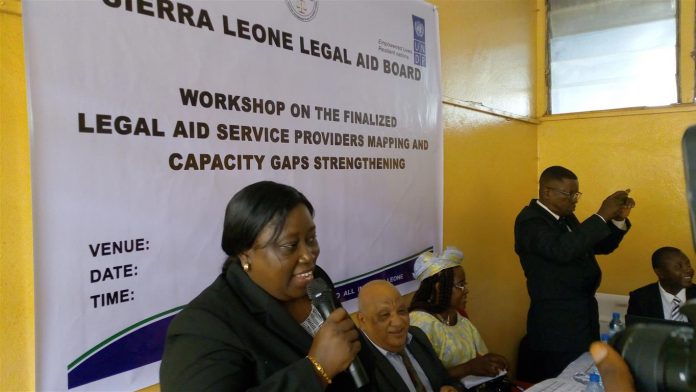By Joseph Dumbuya
The Legal Aid Board has organized a one-day United Nations Development Programme (UNDP) funded Workshop on the Mapping of Legal Aid Providers for 127 legal aid providers drawn from the Western Area. The workshop was held in the Solidarity Hall of the Sierra Leone Labour Congress on Wallace Street in Freetown on September 17.
The Workshop follows the completion of the second phase mapping of 619 Legal Aid Providers in Sierra Leone. This includes 376 organizations (including community based and civil society organizations) and 376 persons providing legal aid. Both the first and second phase mappings were funded by the UNDP.
Giving an overview of the workshop, the Executive Director of the Legal Aid Board, Ms. Fatmata Claire Carlton-Hanciles said the production of a comprehensive database of legal aid providers will usher transparency and accountability in the provision of legal aid in the country. She added that this will bring about increased and quality legal aid services. It will also improve collaboration and networking.
‘The mapping has provided an insight into the number of legal aid providers in the country, type of legal aid services they provide, the areas of the country where they operate, their target beneficiaries and resources – both human and material – at their disposal,’ she said. ‘This is important in our work in terms of resources sharing, referrals and collaboration,’ she added.
Ms. Carlton-Hanciles spoke on efforts by the Board, Judiciary, UNDP and Open Society Initiative for West Africa (OSIWA) at training Paralegals which is a requirement for their being accredited to do Paralegal work in Sierra Leone. ‘A curriculum has already been developed, thanks to support from UNDP and OSIWA,’ she said. ‘The Judicial will be introducing courses in Paralegal studies through the Judicial and Legal Training Institute (JLTI). Also, the Board is in discussion with the Ministry of Tertiary and Higher Education on the introduction of Paralegal studies in universities and colleges.’
The opening session was followed by three Presentations: Accreditation of legal aid provides which is a requirement to engage in the provision of legal aid; Reporting on activities – narrative and financial – and data collection and the Draft Cooperation Agreement which will be entered into by the Board and Legal Aid Providers. This is consistent with Section 33(1) of the Legal Aid Act 2012 which provides that for purposes of implementing the Legal Aid Board Act, the Board may enter into cooperation agreement with legal aid providers
The Legal Aid Providers agreed not to charge a fee or demand in kind payment for their services. They also agreed to submit quarterly reports and returns of their activities to the Board.
The regulatory body, the Board shall monitor and evaluate the quality of legal services provided by legal aid providers, make available to the Legal aid provider a template for data collection, refer a legal aid practitioner or pupil barrister to the General Legal Council for appropriate action where the results of monitoring and evaluation indicate that a legal aid practitioner or pupil barrister has been guilty of unprofessional conduct and assist with capacity building training depending on the availability of funds.
The workshop will be replicated in the other four regions in the country in the coming week.




